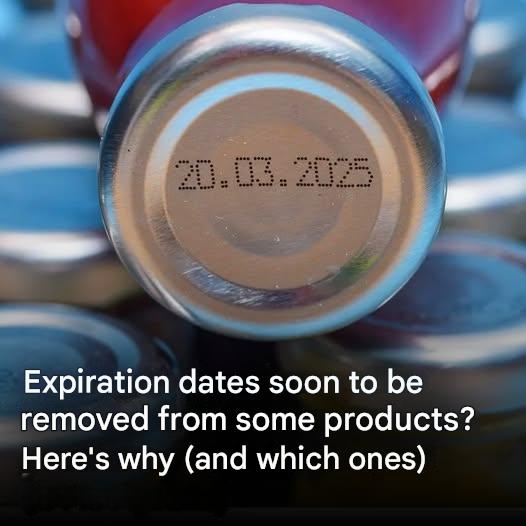ADVERTISEMENT
The Announced End of Expiration Dates on Certain Products: Towards an Anti-Waste Revolution?
In recent years, the conversation around food waste has gained significant traction. As the global population grows and the environmental impacts of waste become more evident, there is an increasing focus on how we can reduce the amount of food that ends up in landfills. One of the most surprising developments in this movement is the growing push for the end of expiration dates on certain products. Could this shift signal a new era of sustainability, reduced waste, and a change in consumer behavior? Let’s take a closer look at what this means and what it could mean for our food system.
🛑 Why Are Expiration Dates on Food Products So Controversial?
Expiration dates have long been a fixture on food packaging, with labels such as “best before,” “use by,” and “sell by” commonly found on everything from dairy to canned goods. While these dates were originally intended to ensure the safety and quality of food, they have increasingly come under scrutiny.
The Problems with Expiration Dates:
- Confusion for Consumers: Many consumers interpret expiration dates as definitive indicators of when a product becomes unsafe to eat. However, research shows that food products can remain safe and edible well beyond their printed expiration date. For example, dairy products and meats can often still be consumed safely after their “use by” date, provided they have been stored correctly.
- Excess Food Waste: A major concern is that consumers often throw away perfectly good food because of expiration dates, contributing to food waste. According to some estimates, around 30-40% of food produced globally is wasted, and a significant portion of that waste stems from people discarding food prematurely based on these labels.
- Unnecessary Financial Loss: For individuals and families, throwing away food due to confusion over expiration dates represents a loss of money. For food retailers, it’s a loss of inventory and revenue.
🌱 A New Approach: End of Expiration Dates on Certain Products
In response to these issues, some countries, companies, and even advocacy groups are starting to question the role of expiration dates in the fight against food waste. Several initiatives have been proposed or already implemented to phase out expiration dates on certain products, particularly those that are less prone to spoilage.
What’s Being Proposed?
- Revised Labeling: Instead of using arbitrary “use by” dates, some products may simply be labeled with “best before” dates, which indicate when the product is likely to be at its peak quality. These dates are more about quality than safety. After the “best before” date, the food may not taste as good, but it may still be completely safe to eat.
- Expanded Use of ‘Smell, Taste, and Look’ Indicators: Rather than relying on printed dates, consumers are encouraged to trust their senses—smelling, tasting, and visually inspecting food products to assess their safety. This move toward a more intuitive and less restrictive way of determining edibility could empower people to keep food longer and reduce waste.
- Government Regulation Changes: Some governments have begun to push for changes in labeling laws. For example, the European Union has explored the idea of eliminating “sell by” and “use by” dates on certain foods, focusing only on “best before” for items that do not have a significant food safety risk.
- Manufacturer and Retailer Initiatives: Several major food manufacturers and retailers are joining the anti-waste revolution by voluntarily eliminating expiration dates on certain non-perishable foods. For example, some brands of pasta, rice, and canned goods are now being sold without the typical expiration date, focusing on packaging that encourages consumers to use their judgment.
🌍 The Environmental Impact: A Step Toward Sustainability
The shift toward removing expiration dates on certain products could significantly reduce the amount of food that is wasted worldwide. By extending the shelf life of food products and promoting a shift in how we think about food freshness, we can tackle some of the most pressing environmental issues related to food waste.
Environmental Benefits of Removing Expiration Dates:
- Reduction in Landfill Waste: Food waste accounts for a significant portion of waste in landfills, and discarded food contributes to greenhouse gas emissions. By cutting down on unnecessary waste, we can reduce the environmental impact of food production and disposal.
- Lower Carbon Footprint: Less food waste means fewer resources—water, energy, labor, and land—used to produce new food. This can lead to a decrease in the carbon footprint of the food industry as a whole.
- Encouraging Smarter Consumption: Removing arbitrary expiration dates could encourage consumers to plan meals more thoughtfully, avoid over-buying, and be more mindful of food they already have. This shift can promote a more sustainable and intentional way of living.
